The Sault Ste. Marie office of the Canadian Hearing society will reopen next week, even as workers continue to strike says a spokesperson for the non-profit organization.
Gary Malkowski, spokesperson for the hearing society, said the Sault office will reopen once per week during the strike to provide counselling support for the deaf and hearing impaired clients in the community, as well as for communication device repair and sales.
Remote interpreting services for emergency situations have also been set up with Sault Area Hospital, said Malkowski.
Nine members of Canadian Union of Public Employees (CUPE) Local 2073, who work at the Sault Ste. Marie office of the Canadian Hearing Society (CHS), have been walking the picket line in front of the closed Queen Street office since last week.
“Our strike committee did invite the employer to the table three times last week and the employer did not respond. As of today, it’s in their hands,” said Kerri Tuckett, hearing care counsellor and the Sault Ste. Marie picket captain for CUPE Local 2073.
Malkowski said it is the union that walked out on bargaining sessions shortly before commencing their strike action.
“We have always been, and will always be, committed to negotiating a new collective agreement. To date, CUPE has not presented us with a reasonable or financially sustainable response to our last offer,” said Malkowski.
In an email, the organization said it is offering a retroactive wage increase, maintaining group benefits at current levels while seeking a modernization of the paid sick day program.
The union said workers have not received a wage increase in four years while executive salaries have risen and claim CHS is demanding major roll backs to health benefits.
NDP leader Andrea Horwath and local byelection candidate Joe Krmpotich stopped by the picket line early this afternoon.
Horwath said she heard frustration from the striking workers she spoke to.
“These are people who work with deaf and hard of hearing folks day in and day out and folks who are vulnerable and need their help. They are little bit worried about the impact on their clients,” said Horwath.
Malkowski said CUPE walked away from the negotiating table in 2013, while the terms of the expired collective agreement remained in place.
“That means employees have continued to receive benefits, wage grid increases and the rights afforded by all other provisions in the agreement since 2013. CUPE did not persist with bargaining a renewal collective until later in 2016,” said Malkowski.
CUPE Local 2073 represents 227 workers across Ontario, including counsellors, literacy instructors, audiologists interpreters, among others at 24 CHS offices across Ontario.
Tuckett said the nine local workers on strike haven’t been picketing alone, with members of various other unions, friends, family and clients joining in.
“I really just want to thank all of our support in Sault Ste. Marie, as well as the clients. Every day we have had people picketing, people who have difficulty walking but being here for us, people bringing coffee,” said Tuckett.
Even the support by motorists honking as they pass by the Queen Street picket line has been lifting the spirits of the striking workers in the bitter cold weather, she said.
“It’s just heart-warming,” said Tuckett.
The Sudbury CHS remains open and Malkowski said CHS is offering ‘innovative ways’ to provide client services in the north, including a Video Remote Interpreting service to clients for appointments and everyday activities..
“This service enables an interpreter to interface between ASL/English users and LSQ/French users on mobile devices such as iPads and iPhones,” he said.
Krmpotich said he is concerned for the isolated local CHS clients who rely on the services it provides.
“Where do (the clients) go locally when all of this is going on? There’s really no place to go. At the end of the day, we want to make sure those people are taken care of,” said Krmpotich.
He added, “get back to the table, get a good collective agreement for everybody and then we move on. It’s that simple.”
